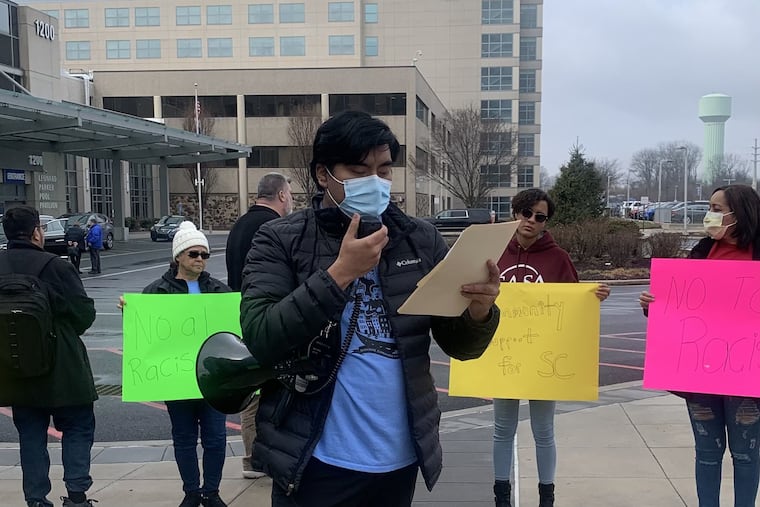Immigration activists try to stop Allentown hospital from sending comatose woman out of the country
This is at least the second time in three years that a Pennsylvania hospital has sought to carry out a so-called 'medical deportation'

Immigration activists are trying to stop an Allentown hospital from forcibly repatriating a desperately ill woman to her Dominican Republic homeland, saying the undocumented mother of two could die if sent away.
The 46-year-old woman, identified only as S.C. to protect her privacy, experienced complications from surgery after suffering a brain aneurysm in late December. Since then, she has been in a coma at Lehigh Valley Health Network’s Lehigh Valley Hospital-Cedar Crest.
“Her husband and son have been taking turns watching over her, because they’re very concerned the hospital is going to move her without their consent,” said Adrianna Torres-Garcia, deputy director of the Free Migration Project, a Philadelphia-based advocacy group.
The health network said that it could not comment on the woman’s case because of privacy laws, but that it “works tirelessly with patients and their families to ensure they receive appropriate care.”
This is at least the second time in three years that a Pennsylvania hospital has sought to carry out a so-called medical deportation, where extremely ill, undocumented patients are sent to their homelands in what lawyers say are attempts to shed the expense of their ongoing care.
Hospitals charter private flights to transport people, and the journey often ends in the aggravation of their illness or death, advocates said. Often patients are sent to homelands that cannot provide the care that’s needed.
The situation in Allentown began on Dec. 29, when severe headaches took S.C. to a different hospital in the health network, from where she was taken by ambulance to Cedar Crest. The next day, she underwent surgery for an aneurysm that was obstructing her optic nerve, suffering a stroke that left her in critical condition, according to her husband, Junior Rivas, 52.
Doctors placed her in an induced coma to promote her healing. Three weeks later, coma-inducing medicine was withdrawn, but she did not wake up, as expected. Since then she has been bedridden and requires high-level care to survive.
“Through this whole process, the doctors have been excellent in taking care of my wife,” her husband said. “However, the hospital administration has become hostile toward me and my family.”
On Feb. 27 the hospital told him he must either pay $500 a day for equipment to care for his wife in their home, find another facility to admit her, or consent to her removal. He was given 48 hours to decide before the hospital flew her away, he said.
Advocates said the family was told that S.C. would be transported to the Dominican Republic by private charter plane by March 2.
That day, members of the Pennsylvania Immigration and Citizenship Coalition, Make the Road Pennsylvania, CASA, and the Free Migration Project demonstrated outside the hospital. The hospital gave the family an additional week to make its choice, advocates said.
Torres-Garcia said the coalition of immigrant-advocacy groups is asking the hospital to continue providing care until S.C. can be transferred to a suitable facility, and to confirm that it will not subject her to a private deportation.
Andy Kang, executive director of the Pennsylvania Immigration and Citizenship Coalition, said the groups have contacted the governor’s office to seek help.
“This is immoral, and we need to find a way to ban its practice,” he said.
These types of private deportations are unregulated and ungoverned, most occurring “in the shadows,” concluded a joint study by Seton Hall University School of Law’s Center for Social Justice and the Health Justice Program at New York Lawyers for the Public Interest.
Those groups declared that by allowing the practice, the United States was violating its human rights obligations under a variety of treaties.
Even the term “medical deportation” is a misnomer, since the power of deportation rests with the federal government, not with hospitals or flight companies.
Yet the practice goes on quietly, occurring when hospitals transfer undocumented patients who need chronic care to their home countries. Often patients and families have not given their consent to be removed, according to studies and to the Norris McLaughlin law firm, which practices in Pennsylvania, New Jersey, and New York.
Removals typically occur with no involvement by federal immigration courts or the Department of Homeland Security. Instead the decisions are made by insurance companies, doctors, hospital financial officers and administrators, and patients and their families may not be part of those discussions.
Hospitals are bound by federal laws to arrange post-hospital care for patients who need it. But these kinds of cases present financial quandaries. Undocumented people typically are not eligible for health insurance, nor for most government programs, which makes long-term care facilities reluctant to accept them as patients.
In June 2020, advocates rallied to stop Jefferson Health from removing an undocumented Guatemalan man with a serious brain injury. The man, who was injured in a motorcycle accident a month earlier, was being sent away from Jefferson Torresdale Hospital.
After the outcry, he was discharged to a long-term care facility.
Now advocates are working to achieve a similar outcome for S.C.
“I have refused at all times to have her transported out of the country,” her husband said, “and I have not signed any document consenting to her transport.”